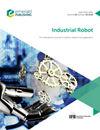Design and performance analysis of an adaptive omnidirectional wheel for heavy payload robot
IF 2.5
4区 计算机科学
Q3 ENGINEERING, INDUSTRIAL
Industrial Robot-The International Journal of Robotics Research and Application
Pub Date : 2022-06-20
DOI:10.1108/ir-01-2022-0024
引用次数: 2
Abstract
Purpose With the development of automation technology, the accuracy, bearing capacity and self-adaptation requirements of wheeled mobile robots are more and more demanding under various complex conditions, which will urge designers such shortcomings as the low accuracy, poor flexibility and weak obstacle crossing ability of traditional heavy haul vehicles and improve the wear resistance and bearing capacity of traditional omnidirectional wheels. Design/methodology/approach The optimal configuration for heavy payload transportation is obtained by building sliding friction consumption model of traditional wheels with different driving types based on Hertz tangential contact theory. The heavy payload omnidirectional wheel with a double-wheel steering and a coupled differential wheel driving is designed with the optimal configuration. The wheel consists of a differential gear train unit and a nonindependent suspension unit. Kinematics model of the wheel is established and relative parameters are optimized. Findings The prototype experiments show that the wheel has higher motion accuracy and environment adaptability. The results are consistent with the theoretical calculation, which show that the accuracy is more than 50% higher than that of differential prototype. The motion stability and the accuracy of the coupled differential omnidirectional wheel are better than those of the traditional omnidirectional wheels during the moving and obstacle crossing process under complex conditions, which verifies the correctness and advantages of the design. Originality/value Aiming at the specific application of heavy payload omnidirectional transportation, a new omnidirectional mobile mechanism with a two-wheel coupling drive structure and an adaptive mechanism is proposed. The simulation and experimental results show that it can realize the high-precision heavy-load omnidirectional movement, the effective contact with the ground and improve the adaptability to the rugged ground. It is flexible, simple and modular and can be widely applied to transportation, exploration, detection and other related industrial fields.大载荷机器人自适应全向轮的设计与性能分析
随着自动化技术的发展,对轮式移动机器人在各种复杂条件下的精度、承载能力和自适应要求越来越高,这将促使设计者克服传统重载车辆精度低、灵活性差、过障能力弱等缺点,提高传统全向车轮的耐磨性和承载能力。设计/方法/途径基于赫兹切向接触理论,建立不同驱动类型的传统车轮滑动摩擦消耗模型,得到重载运输的最优配置。设计了双轮转向-差速轮耦合驱动的大载荷全向轮。车轮由差动轮系单元和非独立悬挂单元组成。建立了车轮的运动学模型,并对相关参数进行了优化。结果样机实验表明,该车轮具有较高的运动精度和环境适应性。结果与理论计算相吻合,精度比差分样机提高50%以上。在复杂条件下的移动和越障过程中,耦合差动全向轮的运动稳定性和精度优于传统全向轮,验证了该设计的正确性和优越性。针对大载荷全向运输的具体应用,提出了一种具有两轮耦合驱动结构和自适应机构的全向移动机构。仿真和实验结果表明,该系统能实现高精度重载全向移动,与地面有效接触,提高对崎岖地面的适应性。它具有灵活、简单、模块化等特点,可广泛应用于交通运输、勘探、检测等相关工业领域。
本文章由计算机程序翻译,如有差异,请以英文原文为准。
求助全文
约1分钟内获得全文
求助全文
来源期刊
CiteScore
4.50
自引率
16.70%
发文量
86
审稿时长
5.7 months
期刊介绍:
Industrial Robot publishes peer reviewed research articles, technology reviews and specially commissioned case studies. Each issue includes high quality content covering all aspects of robotic technology, and reflecting the most interesting and strategically important research and development activities from around the world.
The journal’s policy of not publishing work that has only been tested in simulation means that only the very best and most practical research articles are included. This ensures that the material that is published has real relevance and value for commercial manufacturing and research organizations. Industrial Robot''s coverage includes, but is not restricted to:
Automatic assembly
Flexible manufacturing
Programming optimisation
Simulation and offline programming
Service robots
Autonomous robots
Swarm intelligence
Humanoid robots
Prosthetics and exoskeletons
Machine intelligence
Military robots
Underwater and aerial robots
Cooperative robots
Flexible grippers and tactile sensing
Robot vision
Teleoperation
Mobile robots
Search and rescue robots
Robot welding
Collision avoidance
Robotic machining
Surgical robots
Call for Papers 2020
AI for Autonomous Unmanned Systems
Agricultural Robot
Brain-Computer Interfaces for Human-Robot Interaction
Cooperative Robots
Robots for Environmental Monitoring
Rehabilitation Robots
Wearable Robotics/Exoskeletons.

 求助内容:
求助内容: 应助结果提醒方式:
应助结果提醒方式:


